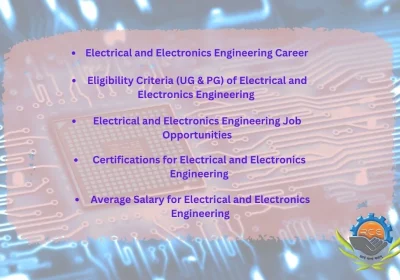
Is Mechanical Engineering a good career?
Mechanical Engineering can be a rewarding career for people who are interested in designing, building, and testing mechanical systems. It is a broad field that encompasses many different industries, including automotive, aerospace, manufacturing, and energy.
Mechanical engineers use principles of physics, engineering, and materials science to design and build machines, devices, and systems that can perform a variety of tasks. They may work on the development of new products or the improvement of existing ones, and they may be involved in the production, testing, and maintenance of these products.
Overall, mechanical engineering can be a good career choice for people who enjoy problem-solving, have strong analytical skills, and are interested in working with their hands. It can be a challenging field, but it can also be very rewarding for those who are up to the task.
There are many factors to consider when deciding whether mechanical engineering is a good career for you. Here are a few things to think about:
- Do you enjoy math and science? Mechanical engineering requires a strong foundation in math and science, including subjects such as calculus, physics, and materials science. If you enjoy these subjects and are comfortable with them, you may find mechanical engineering to be a good fit.
- Are you good at problem-solving? Mechanical engineering often involves finding creative solutions to complex problems. If you enjoy working through problems and coming up with innovative solutions, you may find mechanical engineering to be a rewarding career.
- Do you enjoy working with your hands? Many mechanical engineers work on building and testing prototypes, which may involve hands-on work in a laboratory or workshop setting. If you enjoy working with tools and machinery, you may find mechanical engineering to be a good career choice.
- Are you interested in a specific industry? Mechanical engineering is a broad field that encompasses many different industries, including automotive, aerospace, manufacturing, and energy. If you have an interest in a specific industry, you may want to consider focusing your studies and career in that area.
- Are you willing to continue learning throughout your career? Mechanical engineering is a rapidly evolving field, and mechanical engineers are expected to stay up-to-date on the latest technologies and techniques. If you are willing to commit to ongoing learning and professional development, mechanical engineering may be a good career choice for you.
Mechanical Engineering Course
A mechanical engineering course typically covers a wide range of topics, including:
- Mathematics: Mechanical engineers use math to analyze and design systems, including calculus and differential equations.
- Physics: Mechanics, thermodynamics, and materials science are important areas of study in mechanical engineering.
- Computer science: Many mechanical engineering courses include coursework in computer programming and computer-aided design (CAD).
- Mechanics: This includes statics (the study of forces acting on stationary objects) and dynamics (the study of how objects move).
- Thermodynamics: The study of heat transfer and energy conversion.
- Materials science: The study of the properties and behavior of different materials, including metals, plastics, and composites.
- Manufacturing: Mechanical engineers may study different manufacturing processes and methods, including casting, forming, and machining.
- Design: Mechanical engineers learn how to design and analyze mechanical systems, including machines, engines, and structures.
- Controls: This includes the study of control systems, which are used to control the operation of mechanical systems.
In addition to these core subjects, mechanical engineering students may also have the opportunity to take elective courses in specialized areas such as robotics, bioengineering, or renewable energy.
Mechanical Engineering Scope
Mechanical engineering is a broad field that encompasses many different industries and applications. Some of the areas where mechanical engineers may work include:
- Automotive: Mechanical engineers may work on the design and development of cars, trucks, and other vehicles. They may also work on improving the efficiency and performance of engines and other mechanical systems.
- Aerospace: Mechanical engineers may work on the design and development of aircraft, spacecraft, and missiles. They may also work on the development of new propulsion systems and materials for use in the aerospace industry.
- Manufacturing: Mechanical engineers may work on the design and development of manufacturing equipment and processes, including robotics and automation. They may also work on improving the efficiency and productivity of manufacturing systems.
- Energy: Mechanical engineers may work on the development of renewable energy systems, such as wind turbines and solar panels. They may also work on improving the efficiency of traditional energy systems, such as power plants.
- Healthcare: Mechanical engineers may work on the development of medical devices, such as artificial joints and heart pumps. They may also work on improving the efficiency and effectiveness of healthcare delivery systems.
- Construction: Mechanical engineers may work on the design and development of building systems, such as heating, ventilation, and air conditioning (HVAC) systems. They may also work on the design of large structures, such as bridges and skyscrapers.
These are just a few examples of the many areas where mechanical engineers may work. Mechanical engineering is a diverse field that offers many opportunities for career growth and advancement.
Mechanical Engineering Skills
Mechanical engineering is a field that requires a wide range of skills, including:
- Math skills: Mechanical engineers use math to analyze and design mechanical systems. They must be comfortable with advanced math concepts such as calculus and differential equations.
- Problem-solving skills: Mechanical engineers are often faced with complex problems that require creative solutions. They must be able to analyze problems, identify potential solutions, and choose the best course of action.
- Computer skills: Many mechanical engineers use computer-aided design (CAD) software to create models and drawings of mechanical systems. They may also use computer simulations to test and analyze the performance of these systems.
- Communication skills: Mechanical engineers often work in teams and must be able to communicate effectively with their colleagues. They may also need to prepare reports and presentations, so strong writing and presentation skills are important.
- Attention to detail: Mechanical engineers must be detail-oriented, as even small mistakes can have serious consequences. They must carefully check their work and be thorough in their testing and analysis.
- Creativity: Mechanical engineers must be able to think creatively to come up with innovative solutions to complex problems. They should be able to think outside the box and come up with new ideas and approaches.
- Hands-on skills: Many mechanical engineers work on building and testing prototypes, which may involve hands-on work in a laboratory or workshop setting. They should be comfortable working with tools and machinery and be skilled at troubleshooting and problem-solving.
Mechanical Engineering Syllabus
The syllabus for a Mechanical Engineering program will vary depending on the specific school and program you are enrolled in. However, most mechanical engineering programs will cover similar core topics, including:
- Mathematics: Calculus, differential equations, linear algebra
- Physics: Mechanics, thermodynamics, materials science
- Computer science: Programming, computer-aided design (CAD)
- Mechanics: Statics, dynamics, kinematics
- Thermodynamics: Heat transfer, energy conversion, thermodynamics cycles
- Materials science: Properties and behavior of different materials (metals, plastics, composites)
- Manufacturing: Casting, forming, machining, robotics and automation
- Design: Analysis and design of mechanical systems (machines, engines, structures)
- Controls: Control systems for mechanical systems
In addition to these core subjects, students in a mechanical engineering program may also have the opportunity to take elective courses in specialized areas such as renewable energy, bioengineering, or robotics. The specific courses and topics covered in a mechanical engineering program will depend on the specific goals and focus of the program.
Mechanical Engineering Salary
The salary of a mechanical engineer in India can vary depending on a number of factors, including the engineer’s level of experience, the industry they work in, and the location of their job. According to data from the Indian Institute of Technology (IIT), the median starting salary for a mechanical engineer in India is around INR 4-5 lakh per year.
However, experienced mechanical engineers with advanced degrees and specialized skills can earn significantly more. According to data from Glassdoor, the average salary for a mechanical engineer in India is INR 6,00,000 per year, with a range of INR 4,00,000 to INR 10,00,000 per year.
It’s worth noting that these figures are just estimates, and actual salaries may vary depending on the specific job and the engineer’s qualifications and experience.
Frequently Asked Questions
Q1. Mechanical Engineering salary in india per month
Ans. The average salary for a mechanical engineer in India is approximately INR 50,000 per month, according to data from Glassdoor. However, this figure can vary significantly depending on a number of factors, including the engineer’s level of experience, the industry they work in, and the location of their job.
For example, a mechanical engineer with several years of experience and advanced qualifications may earn a higher salary than a junior engineer just starting out in their career. Similarly, a mechanical engineer working in a high-demand industry or in a location with a high cost of living may earn a higher salary than an engineer working in a different industry or location.
It’s worth noting that these figures are just estimates, and actual salaries may vary depending on the specific job and the engineer’s qualifications and experience.
Q2. What are the subjects in 1st year mechanical engineering?
Ans. The specific subjects studied in the first year of a mechanical engineering program will vary depending on the specific school and program you are enrolled in. However, most mechanical engineering programs will include courses in the following areas:
- Mathematics: This may include courses in calculus, differential equations, and linear algebra.
- Physics: This may include courses in mechanics, thermodynamics, and materials science.
- Computer science: This may include courses in programming and computer-aided design (CAD).
- Introduction to engineering: This may include an overview of the engineering profession and the role of mechanical engineers in particular.
- Technical communication: This may include courses in technical writing, oral presentation, and teamwork.
- Engineering graphics: This may include courses in technical drawing and computer-aided design (CAD).
In addition to these core subjects, first-year mechanical engineering students may also have the opportunity to take elective courses in specialized areas such as robotics, renewable energy, or bioengineering. The specific subjects and courses studied in the first year of a mechanical engineering program will depend on the specific goals and focus of the program.
Q3. Mechanical Engineering Scope in Future
Ans. Mechanical engineering is a broad and diverse field that offers many opportunities for career growth and advancement. The demand for mechanical engineers is expected to continue to grow in the coming years, as advances in technology and increasing concerns about sustainability and the environment create new challenges and opportunities for mechanical engineers to solve.
Some of the areas where mechanical engineers are expected to have particularly strong job prospects in the future include:
- Renewable energy: The demand for renewable energy sources is expected to increase in the coming years, creating opportunities for mechanical engineers to work on the design and development of renewable energy systems such as wind turbines, solar panels, and geothermal systems.
- Robotics and automation: The use of robotics and automation is expected to increase in many industries, including manufacturing, healthcare, and agriculture. This will create demand for mechanical engineers with expertise in these areas.
- Aerospace: The aerospace industry is expected to continue to grow in the coming years, creating opportunities for mechanical engineers to work on the design and development of aircraft, spacecraft, and missiles.
- Healthcare: The demand for medical devices and systems is expected to increase in the coming years, creating opportunities for mechanical engineers to work on the design and development of these devices.
- Transportation: The transportation industry is undergoing significant changes, including the development of electric and autonomous vehicles. This will create demand for mechanical engineers with expertise in these areas.
Overall, the future looks bright for mechanical engineers, with many opportunities for career growth and advancement in a variety of industries.
Q4. Can Mechanical Engineers get high salary?
Ans. Mechanical engineers have the potential to earn high salaries, especially as they gain experience and advance in their careers. According to data from the United States Bureau of Labor Statistics (BLS), the median annual wage for mechanical engineers was $87,040 in 2020. However, some mechanical engineers, particularly those with advanced degrees and specialized skills, can earn significantly more than this.
There are several factors that can influence the salary of a mechanical engineer, including:
- Level of education: Mechanical engineers with advanced degrees, such as a master’s degree or a PhD, may be more competitive in the job market and may earn higher salaries than those with a bachelor’s degree.
- Area of specialization: Mechanical engineers with specialized skills, such as expertise in robotics or renewable energy, may be in high demand and may earn higher salaries than those with more general skills.
- Industry: Mechanical engineers who work in high-demand industries, such as aerospace or healthcare, may earn higher salaries than those who work in less competitive industries.
- Location: The cost of living and the local job market can also influence the salary of a mechanical engineer. Engineers who work in cities with a high cost of living or in regions with a strong demand for their skills may earn higher salaries than those who work in other areas.
Overall, the potential for a high salary is there for mechanical engineers, but it will depend on a variety of factors including education, specialization, industry, and location.
I hope you learn some new from this post if you have any other query please comment below. We will reply you soon.






